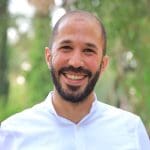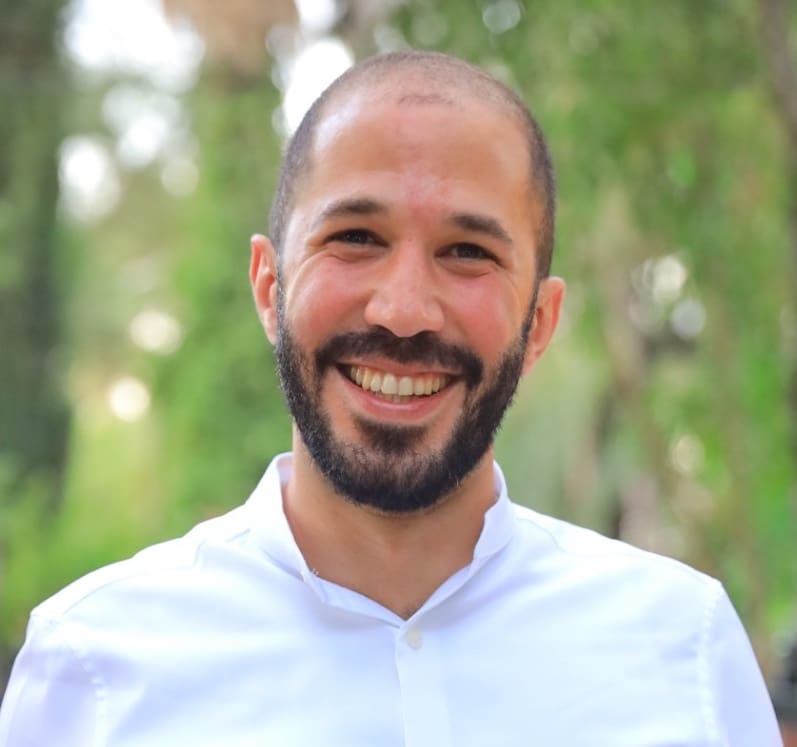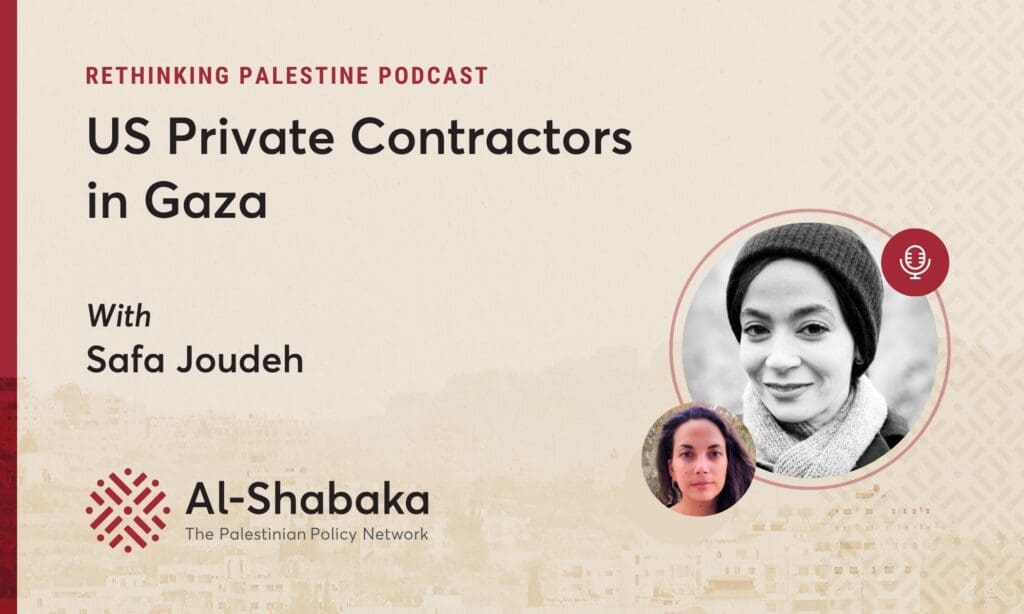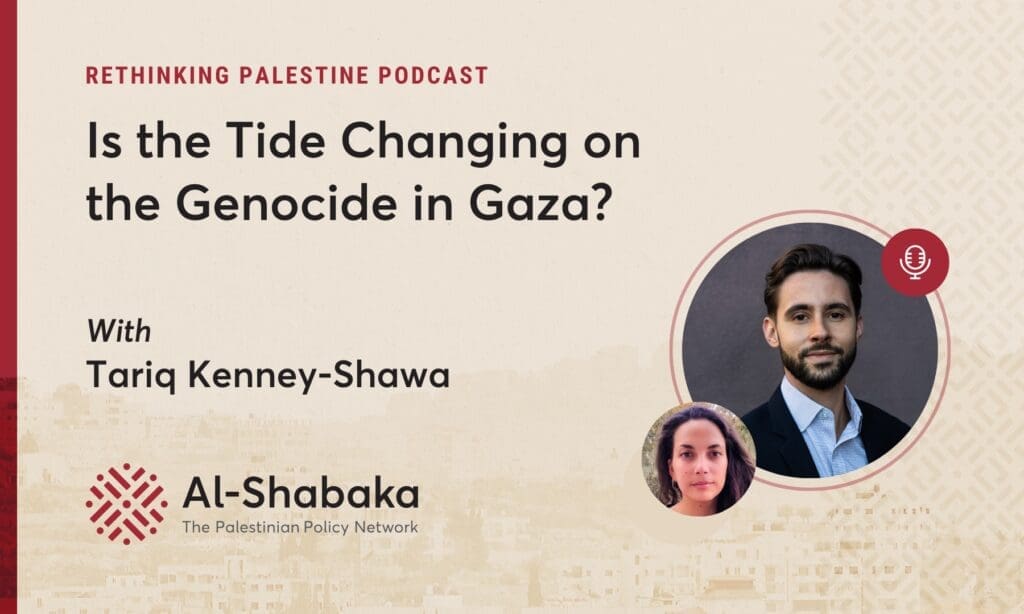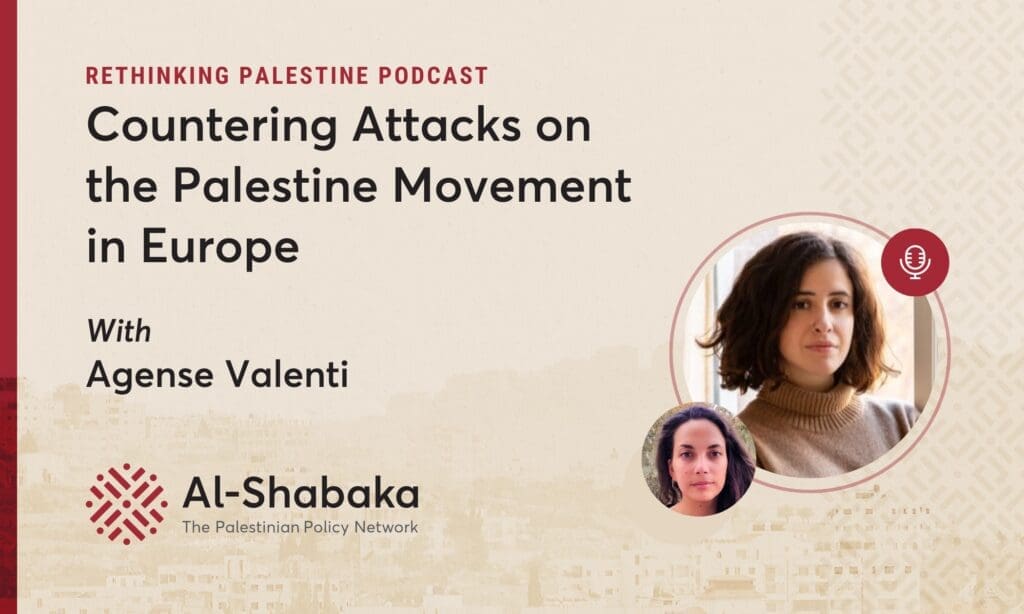About This Episode
Episode Transcript
The transcript below has been lightly edited for brevity and clarity.
Basil Farraj 0:00
These practices, hunger strikes, have to be conceptualized, I think, as a manifestation of prisoners projecting the presence of this apartheid carceral regime in a sense, of prisoners’ desire for freedom and actually as a running towards freedom, not running away from life.
Yara Hawari 0:23
From Al-Shabaka, the Palestinian Policy Network. I am Yara Hawari and this is Rethinking Palestine.
Earlier this month, May, 2023, Sheikh Khader Adnan, a Palestinian political prisoner, died following an 86-day hunger strike in the Ramleh Prison Clinic. He is the first Palestinian prisoner to officially die on hunger strike in an Israeli jail since 1967. While several others have been killed as a result of force feeding.
This was not Khader Adnan’s first hunger strike. Indeed, over the course of two decades, he undertook no less than seven other hunger strikes, one of the first being whilst in prison in a Palestinian Authority jail. Khader Adnan, who was affiliated with the Palestinian group, Islamic Jihad, was a household name and became a symbol of prison hunger strikes, or what became known as the “battle of empty stomachs” across Palestine.
Today there are nearly 500 Palestinian political prisoners incarcerated in Israeli jails. Among them are 160 child prisoners and over 1000 administrative detainees, those held without charge or trial for indefinite periods of time. Hunger striking has become one of their main tools of resistance, and whilst it may seem that inflicting damage on the body is contrary to liberation, hunger strikes allows prisoners to seize back the power of life and death from the incarceration regime.
This is why they’ve been long used as a tool of resistance around the world, from Ireland to South Africa and here in Palestine. Joining me on this episode of Rethinking Palestine is Basil Farraj, Assistant Professor at the Department of Philosophy and Cultural Studies at Birzeit University with expertise in Carcerality. He is also an Al-Shabaka policy member. Basil, thank you for joining me.
Basil Farraj 2:06
Thanks, Yara. My pleasure.
Yara Hawari 2:07
Basil, can you start off by talking to us about the Israeli carceral regime and give us a brief history of Palestinian hunger strikes?
Basil Farraj 2:15
So if we’re thinking about the logic behind the use of hunger strikes, and I think as you rightly pointed out, Yara, that the practice of hunger strikes is not specific to Palestine or the Middle East only.
It’s a historic practice that has long been used in the past and in the present moment by prisoners and by those being oppressed, by particular modes of oppression and violence, to protest their injustices. Usually, and most of the time as a last resort or a last attempt kind of to force, in the case of Palestinian prisoners, to force the carceral authorities to grant them their rights.
So if we’re thinking about actually the history of the Palestinian prisoners’ political movement alongside the history of hunger strikes, we would understand that the use of hunger strikes or the resort to hunger strikes since 1968, which is usually the period that’s most commonly discussed as the beginning of these practices, that most of the rights that Palestinian prisoners have currently at this stage, and which of course this government and the previous governments have been trying to kind of take away from the prisoners, one, have been gained through the resort to multiple forms of resistance practices, including hunger strikes.
For instance, I would say that, and this is documented by multiple prisoners and by human rights organizations, that even a task as simple as refusing to say sir to the jailer, I mean, that tried to kind of, not to have to address your jailer by the term sir, was granted following a hunger strike and on which actually one of the early Palestinians who died in Israeli prisons was Abdul Qader Abu al-Fahem who passed away, who was killed basically, being force fed by the Israeli authorities in 1970 during the hunger strike in Askalan prison.
Of course after, after Abdul Qader Abu al-Fahem, there were a couple other Palestinian prisoners who died following complications or being force fed by the Israeli authorities. So what I’m trying to say is that the history of hunger strikes of course as you had pointed, it’s not specific to Palestine, but I think it’s emergence in the Israeli carceral regime shows one, the history of injustices and denial of rights that Palestinian prisoners had to constantly struggle with.
And second, their attempt to kind of forcibly take their rights away from the carcel authorities, which also I think sheds light on the way the Israeli carceral regime continues and has been dehumanizing Palestinians and treating them as not human subjects. And I think that’s how we can understand the constantly emerging, not only hunger strikes, but also other forms of resistance practices.
To understand this, I think you have to understand the Israeli carceral regime, of course, when I say carceral, it’s not only the physical space of the prison itself, but it’s the broader policies that Israel uses and implements to treat and deal with the occupied Palestinian population, whether in the 1948 area or in the West Bank and the Gaza Strip.
And once we understand that the Israeli carceral regime is based on this kind of discrimination, utter discrimination actually, between the Palestinian political prisoner and the rights that are granted to “Jewish prisoners,” whether they are security prisoners, the term that Israel usually uses for Palestinian prisoners, or “civilian prisoners.”
We would understand that the Israeli regime itself differentiates, the moment you enter that carceral space, the prison, it differentiates between you as a subject Palestinian political prisoner, and that categorization by itself, being categorized as a security prisoner already takes away several rights that are constantly awarded and granted to Jewish prisoners.
So that’s the first layer. To understand that kind of racial aspect of this carceral regime, which places Palestinian prisoners, I think in a very difficult position where they constantly have to fight for their rights. Rights that are not only guaranteed or should be guaranteed by international norms, but also through struggle as I had mentioned previously, that they had actually acquired, for example, the right to pens, to notebooks, to their libraries, to political organization, through multiple protests, including hunger strikes.
Yara Hawari 6:11
Now Basil, people might assume that a hunger strike is the opposite of fighting for liberation. Indeed, one might assume that this is an attempt to end one’s life. Can you explain to us why hunger strikes are considered a struggle for liberation and are used as a form of resistance?
Basil Farraj 6:29
So once we understand that the carceral regime itself functions on this kind of racial or as a racial process that discriminates between Palestinians and other prisoners or others outside the prison, we would understand that the Israeli regime intentionally kind of takes away prisoners’ rights.
And in this sense, we can understand and conceptualize hunger strikes, not as some might want to highlight that these are, prisoners are approaching their own death willingly because they do not want to live, for example, as the Israeli discourse might want to say it actually.
And we had seen this through the statements of multiple Israeli ministers over the past years, they would, for example, categorize hunger strikes as a terrorist act. Or as a prisoner’s attempt to kill themselves. But understanding this broader, I think, political nature of captivity, we would understand that what prisoners are doing when they resort to either collective or individual hunger strikes is an attempt, actually is a last attempt, and I’m not saying here last as in the only attempt, but it’s an attempt to force Israeli authorities, the carceral authorities, the government, to grant them rights that they deserve, in a sense.
And once we understand this and highlight the racial aspect of the carceral regime, we would understand that these practices are prisoners’ practices, whether they are smuggling writings or trying to find creative ways of communicating with their family members, or writing about captivity or hunger strikes or for example the recent attempts to boycott Israeli military courts.
That these protests, these mechanisms of protest, and these confrontation practices highlight the political nature of captivity. And also, I think in my understanding, they are part of this broader struggle against the Israeli regime, whether it be inside the prison itself so that Israeli prison service policies, or outside prisons where Palestinians continue to protest and find creative ways of rejecting the presence of this apartheid carceral regime in a sense.
So, just to go back to your question, Yara, I definitely agree. I mean, these practices, hunger strikes, have to be conceptualized, I think as a manifestation of prisoners’ desire for freedom, I think, and actually as a running towards freedom, not running away from life, if that makes sense.
And I think also at the same time, we could understand what Khader Adnan has done. Unfortunately, of course, his death, which was very difficult to bear for the Palestinian prisoners, and for the Palestinian national movement in a sense. But I think what he has been constantly doing through his multiple hunger strikes is protesting this injustice of administrative detention.
It actually went a step further by protesting the entire base upon which this military presence functions. So the Israeli military orders, and Israeli military courts, form the backbone of this Israeli racial carceral reality. So in a sense, again, just to reiterate, it’s running towards freedom or imagined freedom that we all aspire towards.
I think it’s very painful. I cannot imagine what being on a hunger strike has meant, not only to the families of prisoners but to the prisoners themselves. I think it’s a very painful resistance practice, but we should definitely emphasize that Palestinian prisoners’ long history and trajectory of confrontation practices have always included these political manifestations of freedom and I think hunger strikes are one instance.
And ultimately, again, as I had begun, what prisoners had gained over the years had been through the struggle. Their rights were not granted, and they were not given by the Israeli authorities out of care for prisoners. They were granted to prisoners constant confrontation against the carceral regime. And hunger strikes have constantly been one example, one site of struggle.
Yara Hawari 10:07
If you’re enjoying this podcast, please visit our website, al-shabaka.org, where you’ll find more Palestinian policy analysis and where you can join our mailing list and donate to support our work.
You mentioned that one of the first hunger strikes was to win the right to not address the prison guards as sir, and that Khader Adnan went on strike to protest his administrative detention. What other kinds of demands do hunger strikers make nowadays?
Basil Farraj 10:33
Yeah, so I was mentioning the 1970 Askalan hunger strike, which was a seven-day hunger strike, one of the prisoners’ demands, which were written actually at that stage on a cigarette. One of the articles documenting this early hunger strike notes that one of the demands was written on a cigarette pack, and it included the prisoners’ refusal to address the jailer as “sir”, and that’s when Abdul Qader Abu al-Fahem died after being force-fed with what’s referred to as the Zonda so it’s the force-feeding tube that the Israeli authorities had used against his body.
The other demands, for example, include the 2012 mass hunger strike and the 2014 mass hunger strike that, in addition to demanding an end to the use of administrative detention, which the listeners might know, it’s Israeli recourse to arbitrary and prolonged detention of Palestinians based on “secret files” or secret materials that are not shared with the detainee or his lawyers, or her lawyers. But the other demands also included an end to solitary confinement and isolation practices of prisoners. There had been also in 2012, the demand of restoring family visitations for Gazan families for Gazan prisoners.
And then the 2014, for example, mass hunger strike, which you might remember, it was a mass hunger strike particularly focused on administrative detainees, which was kind of one of the first collective attempts to counter the use of administrative detention. And I think if we look back again at the history of hunger strikes, we would notice, and this is of course epitomized by Khader Adnan’s martyrdom, that the recent resort to hunger strikes has been an attempt to scream against this arbitrary policy. And just to give the listeners here some recent statistics, for example, Addameer, which is one of the organizations that work for prisoners’ rights in Palestine.
They show that this month in May there are 1014 administrative detainees, which is a huge jump from the past month. So we can see that the Israeli authorities are resorting more and more to administrative detention as a practice of punishing Palestinians. So in this sense, we could understand the constant resort or attempt to use hunger strikes as a means to counter administrative detention and the practice it implies.
And also just to contextualize a recent event on May 15th, Palestinian prisoners for a one-day hunger strike demanding the release of Khader Adnan’s body and demanding the release of Walid Daqqah and the end of solitary confinement of the General Secretary of the Popular Front for the Liberation of Palestine, Ahmad Sa’adat, and two of his comrades who have been sent to solitary confinement recently.
So Yara, in a sense, what I’m saying is that multiple demands are issued through hunger strikes. I think it depends on the context and and the particular moment in our struggle for liberation. But they ranged from demanding or refusing to say sir, to demanding freedom as we had seen in the recent individual hunger strikes by Palestinian prisoners.
And I think that was the demand, right? It was freedom for Khader Adnan and for the other prisoners who individually striked against administrative detention.
Yara Hawari 13:46
Let’s turn back to Khader Adnan he was such an important figure among Palestinian political prisoners as one of the leaders of the hunger strikes. But why is he important for Palestinian society beyond the prison walls?
Basil Farraj 14:00
So I think, Yara, I think we all maybe can recall his first, might have been his second hunger strike, cause I was reading that he also participated in a hunger strike in 2004. But I’m sure most of us remember the way his first strike against administrative detention in 2011, which lasted for 66 days, the way it had managed to galvanize the Palestinian street, and not only actually the Palestinian street, but how he had become a symbol of refusing to accept Israeli military court orders and Israeli military law. I clearly remember seeing his face on the graffiti on walls in the West Bank and in Jerusalem.
And actually, the way he had inspired later on what we have been witnessing over the past 10 years or so of mass hunger strikes and individual hunger strikes that have been demanding the end of administrative detention as one of the cornerstone policies of the Israeli carceral practice. And the way he had inspired other prisoners to follow his path and demand their own freedom as well in protest of this arbitrary practice that Israel has long been practicing since its violent existence on our land.
So I think that’s where perhaps some of Khader Adnan’s strength comes. I mean, his image, his persona. But I think also, sadly again, I think his martyrdom is also a wake-up call for us. I mean, Yara, this might be of course a sad reality when we are talking about Palestinian prisoners and detainees who are sick, who are neglected.
Israeli carceral practices not only include this kind of arbitrary punishment and excessive sentencing, but also they include the medical negligence aspect where we have, at least statistics show that 700 prisoners are very ill with over a dozen of them who are sick with cancer, with forms of cancer.
And then we have prisoners who linger, still linger behind bars since before the signing of what was supposed to, in a sense, turn this reality into a two-state reality, which never materialized. Instead, it materialized in the ongoing captivity of those thousands of people, many of whom have spent over 35 years in captivity, Yara, and those who are sentenced, for example, to multiple life sentences.
So I think what Khader Adnan symbolizes is not just the hunger strike for liberation or the attempt to kind of force your jailer to give you your freedom. And in his case, it’s his freedom through his death, basically this time, his martyrdom. But I think he also makes, perhaps, his martyrdom a call to action for us to re-look actually at what Palestinian prisoners mean.
Why did these people, why have they spent most of their lives behind bars? What does it mean to have a national movement which did not, which is not able actually not in the past it’s in the present, it’s not able or had not been able yet to liberate all of its prisoners, all of its members of its struggle, basically.
And particularly to think about those who have lingered for decades behind Israel’s walls, including, for instance, Walid Daqqah, who, as listeners might know has been diagnosed with a very rare disease. And I think here we have Khader Adnan, and we have also the triumph of the six Palestinian prisoners who managed to dig their own way to freedom.
So in a way, I think it’s a wake-up call and also perhaps an assertion of the Palestinian prisoners, and by prisoners I mean us outside prisons and those inside prisons, an assertion of our desire for freedom. A desire for freedom that we have to work for.
That will not just be simply given to us, again as in the 1970 hunger strike where prisoners had won their right to address their jailer as jailer through struggle. So they basically made that confrontation clear between them as prisoners, as captives, and between the prison authority as their jailer, as their occupier.
Yara Hawari 18:02
That’s an important point to end on, that the struggle of Palestinian political prisoners teaches us a lot about the larger struggle for Palestinian liberation. It teaches us about perseverance and collective action, but also it teaches us about finding ways to resist in spaces where there seems to be no hope.
Basil, thank you so much for joining me on this episode of Rethinking Palestine.
Basil Farraj 18:23
Thank you, Yara.
Yara Hawari 18:35
Rethinking Palestine is brought to you by Al-Shabaka, the Palestinian Policy Network. Al-Shabaka is the only global, independent Palestinian think tank whose mission is to produce critical policy analysis and collectively imagine a new policymaking paradigm for Palestine and Palestinians worldwide. For more information or to donate to support our work, visit al-shabaka.org and importantly, don’t forget to subscribe to Rethinking Palestine wherever you listen to podcasts.







